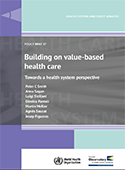Building on value-based health care: towards a health system perspective (2020)

Download
This brief’s key messages are:
- Preoccupation with the value created by health systems has been longstanding, and will likely only intensify given the ongoing health systems strains and shocks such as the COVID-19 pandemic. But the focus so far has usually been limited to value as seen from the perspectives of certain actors in the health system and/or to certain dimensions of value.
- This policy brief calls for a shared understanding of value that embraces the health system in its entirety, including preventive services and other public health functions. We then define value to be the contribution of the health system to societal wellbeing.
- Any meaningful formulation of the concept of wellbeing includes health, and by extension health systems, as an important contributor to our wellbeing.
- Health improvement, responsiveness, financial protection, efficiency and equity are widely accepted as health systems’ core contributions to wellbeing. Health systems can also contribute to wellbeing indirectly through the spillover effects that its actions have on other sectors.
- Health systems are shaped by a wide array of actors, including national policy-makers, purchasers, providers, practitioners, citizens and patients. These different actors make important but discrete contributions to value, so in order to maximize it, their actions should be aligned. The aim should be to create a value-based health system.
- A range of policy levers can be used to enhance value, ranging from cross-sectoral policies to involving patients in decision-making. While such levers normally focus on one or two dimensions of value, it is important to ensure that they do not undermine other dimensions or the efforts of other actors.
- Effective governance of the whole health system is needed to ensure that stakeholder perspectives and policy levers are aligned to promote a common concept of health system value and, ultimately, of societal wellbeing. There are governance tools, such as the Transparency, Accountability, Participation, Integrity and Capacity (TAPIC) framework, that can help achieve this.
- Moving towards a value-based health system will often be a gradual process, focusing first of all on the areas where it might make the biggest difference.





















